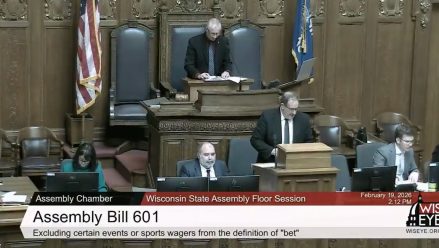Sports betting operators could see taxes go up in yet another state after Wyoming’s Select Committee on Capital Finances and Investment last Thursday took the first steps toward filing legislation to increase tax rates for digital sports betting and historic horse racing (HHR).
So far this year, Maryland lawmakers raised the digital wagering tax there from 15% to 20% effective July 1. In addition, the legislature in Illinois approved a first-of-its-kind per-wager tax, and in Louisiana, lawmakers sent a 6.5% digital betting tax increase to the governor June 8.
In Wyoming, lawmakers are looking to take a page from the Ohio playbook, with plans to drop a bill that would double the current 10% digital betting tax to 20%. Ohio lawmakers did the same in 2023, just six months after wagering launched in that state.
The committee voted unanimously to have a bill drafted to double Wyoming’s sports betting tax. It also approved drafting a bill that would raise the HHR tax from 1.5% to 2.5% and another to increase the tax on skill-based games 5%. But Wyoming’s regular legislative session adjourned in March, so the committee appears to be preparing to have a bill ready for 2026.
Committee wants more dollars for PG and RG
With the goal of directing more funding to problem and responsible gambling initiatives, the committee heard more than an hour of testimony and asked questions of problem and responsible gambling advocates. In addition, Karen Vaughn, associate fiscal analyst and budget/fiscal legislative editor for the legislature, reviewed the amount of tax dollars that the state receives from all forms of gambling, expenses, and expenditures. She said that from sports betting, $300,000 of tax revenue is earmarked for problem and responsible gambling.
After her presentation, Committee Vice Chair Tara Nethercott called for a motion to increase the tax rate from 10% to 20%. In discussion prior to approving the motion, lawmakers asked how much Wyoming border states charge operators. Of the six, only Colorado offers online betting. It taxes operators at 10% of gross gaming revenue.
Across the U.S., Wyoming is one of 10 states that taxes operators 10% or less. Tax rates vary wildly throughout the country, with Iowa and Nevada on the low end, charging 6.75%, and Delaware, New Hampshire, New York, and Rhode Island charging 50% or more.
A key question that lawmakers will have to address in the bill is what agency will manage problem and responsible gambling programs. Stephanie Sandoval, senior administrator for the Department of Health’s Public Health Division, said the agency currently “does not have a program to deal with problematic gambling.” She offered for the Department of Health to either develop one or hand off the responsibility should a new law be put into place.





